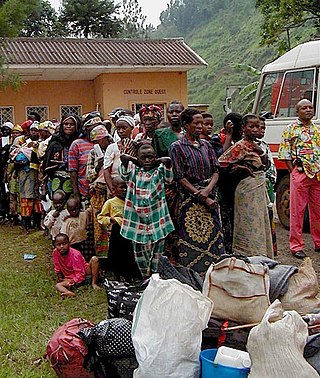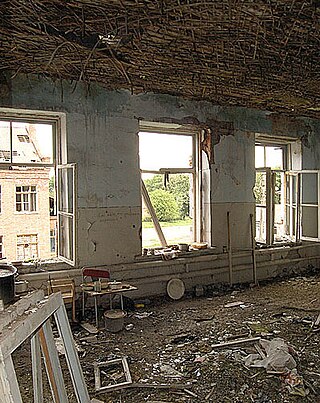
Children in the military, including state armed forces, non-state armed groups, and other military organizations, may be trained for combat, assigned to support roles, such as cooks, porters/couriers, or messengers, or used for tactical advantage such as for human shields, or for political advantage in propaganda. Children have been recruited for participation in military operations and campaigns throughout history and in many cultures.

Peacekeeping comprises activities, especially military ones, intended to create conditions that favor lasting peace. Research generally finds that peacekeeping reduces civilian and battlefield deaths, as well as reduces the risk of renewed warfare.

The Optional Protocol to the Convention on the Rights of the Child on the Involvement of Children in Armed Conflict (OPAC), also known as the child soldier treaty, is a multilateral treaty whereby states agree to: 1) prohibit the conscription into the military of children under the age of 18; 2) ensure that military recruits are no younger than 16; and 3) prevent recruits aged 16 or 17 from taking a direct part in hostilities. The treaty also forbids non-state armed groups from recruiting anyone under the age of 18 for any purpose.

United Nations Security Council Resolution 1325 (S/RES/1325), on women, peace, and security, was adopted unanimously by the UN Security Council on 31 October 2000, after recalling resolutions 1261 (1999), 1265 (1999), 1296 (2000), and 1314 (2000). The resolution acknowledged the disproportionate and unique impact of armed conflict on women and girls. It calls for the adoption of a gender perspective to consider the special needs of women and girls during conflict, repatriation and resettlement, rehabilitation, reintegration, and post-conflict reconstruction.

On Red Hand Day or the International Day against the Use of Child Soldiers in February 12th each year since 2002, pleas are made to political leaders and events are staged around the world to draw attention to child soldiers: children under the age of 18 who participate in military organizations of all kinds. Red Hand Day aims to call for action to stop this practice, and support children affected by it.

In areas of the Democratic Republic of the Congo, the human rights record has remained considerably poor, and serious abuses have been committed. Unlawful killings, disappearances, torture, rape, and arbitrary arrest and detention by security forces increased during the year, and the transitional government took few actions to punish harsh people. Harsh and life-threatening conditions in prison and detention facilities; prolonged pre-trial detention; lack of an independent and effective judiciary; and arbitrary interference with privacy, family, and home also remained serious problems. Security forces continued to recruit and retain child soldiers and to compel forced labour by adults and children.

United Nations Security Council resolution 1261, adopted unanimously on 25 August 1999, in the first resolution to address the topic, the Council condemned the targeting of children in armed conflict including the recruitment and use of child soldiers.

United Nations Security Council resolution 1332, adopted unanimously on 14 December 2000, after recalling resolutions 1234 (1999), 1258 (1999), 1265 (1999), 1273 (1999), 1279 (1999), 1291 (2000), 1296 (2000), 1304 (2000) and 1323 (2000) on situation in the Democratic Republic of the Congo, the Council extended the mandate of the United Nations Mission in the Democratic Republic of Congo (MONUC) until 15 June 2001.

United Nations Security Council resolution 1460, adopted unanimously on 30 January 2003, after recalling resolutions 1261 (1999), 1265 (1999), 1296 (2000), 1306 (2000), 1308 (2000), 1314 (2000), 1325 (2000) and 1379 (2001), the council called for the immediate end to the use of child soldiers and endorsed an "era of application" of international norms and standards for the protection of war-affected children.

United Nations Security Council resolution 1539, adopted unanimously on 22 April 2004, after recalling resolutions 1261 (1999), 1308 (2000), 1314 (2000), 1325 (2000), 1379 (2001) and 1460 (2003), the council condemned the use of child soldiers and asked the Secretary-General to devise a monitoring mechanism.
The Democratic Republic of the Congo (DRC) ratified the 2000 UN TIP Protocol in October 2005.

United Nations Security Council Resolution 1998, adopted unanimously on July 12, 2011, after reaffirming resolutions 1261 (1999), 1314 (2000), 1379 (2001), 1460 (2003), 1539 (2004), 1612 (2005) and 1882 (2009) on the protection of children in armed conflict, the Council declared schools and hospitals off limits for both armed groups and military activities, asking the Secretary-General for such crimes to be placed on a list of those committing "grave violations" against children.
United Nations Security Council Resolution 1820 was unanimously adopted on 19 June 2008. It condemns the use of sexual violence as a tool of war, and declares that “rape and other forms of sexual violence can constitute war crimes, crimes against humanity or a constitutive act with respect to genocide”. The adoption of the resolution marked the first time that the UN explicitly linked sexual violence as a tactic of war with women, peace, and security issues. Security Council Resolution 1820 reinforces United Nations Security Council Resolution 1325 and highlights that sexual violence in conflict constitutes a war crime and demands parties to armed conflict to immediately take appropriate measures to protect civilians from sexual violence, including training troops and enforcing disciplinary measures. In November 2010, the UN Secretary General presented a report on the implementation of UNSCR 1820.
United Nations Security Council Resolution 1889 was unanimously adopted on 5 October 2009.
Military use of schools is a term used to refer to the various activities that national armed forces and non-state armed groups carry out in and around schools, universities, and other education facilities, in support of their military effort. Examples of this include using a school or a university as barracks or bases, for offensive or defensive deployments, for storage of weapons or ammunition, for military training of soldiers, as observation posts, and as a detention facility.

Children under the age of 18 have been used by national armed forces and other armed groups in Africa. Typically, this classification includes children serving in non-combatant roles, as well as those serving in combatant roles. In 2008, it was estimated that 40 percent of child soldiers worldwide were in Africa, and the use of child soldiers in armed conflict was increasing faster than any other continent. Additionally, average age of children recruited as soldiers appears to be decreasing. As of 2017, the UN listed that seven out of fourteen countries recruiting and using child soldiers in state forces or armed groups were in Africa: Central African Republic, Democratic Republic of the Congo, Mali, Nigeria, Somalia, South Sudan, Sudan.
As many as 10,000 children were used by armed groups in the armed conflict in the Central African Republic (CAR) between 2012 and 2015, and as of 2024 the problem persists nationwide with a most likely greater amount fighting now. The mainly Muslim "Séléka" coalition of armed groups and the predominantly Christian, "Anti-Balaka" militias have both used children in this way; some are as young as eight.

The rehabilitation and reintegration of child soldiers is defined by Child Soldiers International as: "The process through which children formerly associated with armed forces/groups are supported to return to civilian life and play a valued role in their families and communities".
A child soldier is "...any person below 18 years of age who is or who has been recruited or used by an armed force or armed group in any capacity".

Children in the military are children who are associated with military organizations, such as state armed forces and non-state armed groups. Throughout history and in many cultures, children have been involved in military campaigns. For example, thousands of children participated on all sides of the First World War and the Second World War. Children may be trained and used for combat, assigned to support roles such as porters or messengers, or used for tactical advantage as human shields or for political advantage in propaganda.

The First Liberian Civil War began in 1989, when Charles Taylor's National Patriotic Front of Liberia (NPFL) forces invaded the country in rebellion against the regime of Samuel Doe, who came to power through the 1980 Liberian coup d'état. Liberians United for Reconciliation and Democracy (LURD), Movement for Democracy in Liberia (MODEL), the United Liberation Movement for Democracy (ULIMO), as well as the NPFL utilized children as an integral aspect of their forces over the course of both armed conflicts, organizing them into factions such as the Small Boys Unit. The First Liberian Civil War as well as the Second Liberian Civil War saw thousands of children were forced to participate in armed conflict, resulting in an estimated figure of 21,000 child soldiers in need of demobilization, rehabilitation, and reintegration following the end of the Second Liberian Civil War in 2003, which concluded with the signage of the Comprehensive Peace Agreement. In the years following the war, the Liberian government was implemented measures to promote their international and national commitment to reintegrating and supporting former Children in the military.












